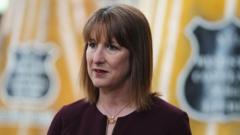Faarea Masud & Michael Race
Business reporter, BBC News
Getty Images
Tough choices are “unavoidable” as the government finalises spending plans for areas ranging from the NHS and defence, to schools and the criminal justice system, a think tank has warned.
The Institute for Fiscal Studies (IFS) said the level of spending on health would dictate whether cuts were made to “unprotected” areas – those outside the NHS, defence and schools.
While funding increased sharply in 2024 for transport, net zero, hospitals, schools and prisons, it would no longer increase year on year, given the government’s commitments, the IFS said.
The government said the Spending Review on 11 June would “scrutinise every single pound the government spends”.
The review will outline day-to-day departmental budgets over the next three years and investment budgets over the next four.
Whitehall insiders have told the BBC they expect it will be “ugly”, and that ministers have been fighting over winning small amounts of cash for their respective departments.
There are concerns that plans such as increasing police numbers in a bid to halve violence against women and girls may not be allocated enough cash. There are also discussions over continued funding for capping bus fares.
Chancellor Rachel Reeves’s stance on ruling out borrowing more money and not raising taxes again has led to strong speculation spending cuts will be made.
The Conservatives said Reeves was only left with seemingly “impossible choices” because she “chose to push borrowing and spending to the limit”.
“They have pushed up the cost of living, unemployment is rising, growth is stalling,” shadow chancellor Mel Stride said. “And yet Rachel Reeves still clings to her tax-and-spend dogma like it’s the 1970s.”
The IFS said the government had “front-loaded” its spending over the course of the parliament term in the first couple of years, which meant spending would slow down. “The consequences of this decision must be confron
Read More





